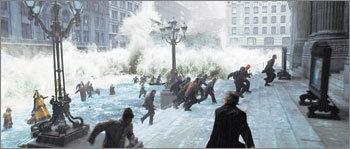No Tomorrow for The Day after Tomorrow
No Tomorrow for The Day after Tomorrow
Posted June. 01, 2004 22:07,

Mega-disaster movie specialist director Roland Emmerich seems to have realized that he needs a topic that will hit his audience in a more visceral way. After all, attacking aliens (Independence Day) and mutated monsters (Godzilla) may be attention-grabbers, but hardly moving or poignant.
This appears to be the lesson informing The Day After Tomorrow, Emmerichs latest offering which opens on June 4. The film tightly weaves together various human dramas, both big and small, with mankind facing potential extinction as colossal natural disasters caused by pollution and global warming strike the earth. The director depicts the planet-wide catastrophe through a more close-up approach, lowering the camera to the individual level of family, friends, lovers, and neighbors struggling to save one another. The problem, of course, is how convincing he can make that story.
While investigating glaciers, climatologist Jack Hall (played by Dennis Quaid) senses a meteorological anomaly: Global warming will thaw the glaciers, change the direction of the currents in the worlds oceans, and bring about an ice age, he warns. But the vice president of the United States dismisses the warning as a distant threat. Meanwhile, Professor Halls son Sam (Jake Gyllenhaal) travels to New York with his girlfriend Laura (Emmy Rossum) to take part in a quiz competition. Soon afterwards, tornadoes, tidal waves, oversized hailstones, and massive blizzards hit the earth. The northern hemisphere becomes covered in ice and an exodus of Americans crossing over into Mexico begins. Isolated in a library, Sam and Laura battle the extreme cold and hunger as Professor Hall heads to the dead zone of New York to save his son.
Hard as Emmerich tries to tie the stories together, the diverse episodes fall apart under the enormous weight of the sprawling spectacle. But then, its hardly an unexpected outcome: Emmerich is famous for mixing all kinds of grand ingredients, whether theyre aliens or natural disasters, in a sizzling furnace of spectacle and churning out awesome thrill rides. In fact, his extraordinary strength (or weakness) is his ability to distill moral lessons from spectacular fareeven natural disaster movies. So, will audiences exit the theater feeling anxious about environmental preservation? Not likely. Theyre more apt to look forward to such a situation as exciting.
The premise that a climatologist perceptive enough to predict a global disaster would set out into the heart of the danger to save his son doesnt quite hold water. However, the real star of this picture is the spectacle itself, made up of the freezing cold, tornadoes, tidal waves, and hail.
Gone also are the American chauvinism and heroism that used to glaze Emmerichs movies. The self-righteous and stubborn vice president, a dead ringer for reputedly hard-headed Vice President Dick Cheney, ends up bowing his head to the Mexicans, thanking them for admitting American refugees. The spineless president (who somewhat resembles former vice president Gore) freezes to death as he leaves the White House at the last minute.
A jab at Americas arrogance? In a Hollywood blockbuster on a $120 million budget (approx. 144 billion won) that seeks to overwhelm audiences with sheer quantity?
Sometimes, even satire can be a luxury. (12 years and over)
Seung-Jae Lee sjda@donga.com




![반찬통 착색 고민 끝…‘두부용기’ 버리지 말고 이렇게 쓰세요 [알쓸톡]](https://dimg.donga.com/c/138/175/90/1/wps/NEWS/IMAGE/2026/01/09/133126593.3.png)


